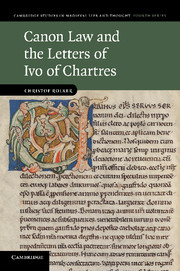Book contents
- Frontmatter
- Contents
- List of abbreviations
- Note on the citation of manuscripts
- 1 IVO OF CHARTRES – ‘LIFE AND LETTERS’?
- 2 CANON LAW BEFORE IVO
- 3 COLLECTIONS KNOWN TO OR COMPILED BY IVO
- 4 THE CANON LAW IN IVO'S CORRESPONDENCE
- 5 HIERARCHIES OF AUTHORITY: IVO's VIEWS ON DIVINE LAW AND THE ECCLESIASTICAL HIERARCHY
- 6 THE LAWS OF MARRIAGE: ‘QUOD ET NATURA DISPOSUIT, ET LEX TAM ECCLESIASTICA QUAM MUNDANA FIRMAVIT’
- 7 IVO'S DECRETUM AND THE PANORMIA: CHARACTER, RECEPTION, AUTHORSHIP
- 8 IVO'S PASTORAL CANON LAW AND HIS PLACE IN LEGAL HISTORY
- Appendix: A concordance table for the quotations in Ivo's letters
- Bibliography
- Index to single letters of Ivo of Chartres
- Manuscript index
- General index
4 - THE CANON LAW IN IVO'S CORRESPONDENCE
Published online by Cambridge University Press: 04 August 2010
- Frontmatter
- Contents
- List of abbreviations
- Note on the citation of manuscripts
- 1 IVO OF CHARTRES – ‘LIFE AND LETTERS’?
- 2 CANON LAW BEFORE IVO
- 3 COLLECTIONS KNOWN TO OR COMPILED BY IVO
- 4 THE CANON LAW IN IVO'S CORRESPONDENCE
- 5 HIERARCHIES OF AUTHORITY: IVO's VIEWS ON DIVINE LAW AND THE ECCLESIASTICAL HIERARCHY
- 6 THE LAWS OF MARRIAGE: ‘QUOD ET NATURA DISPOSUIT, ET LEX TAM ECCLESIASTICA QUAM MUNDANA FIRMAVIT’
- 7 IVO'S DECRETUM AND THE PANORMIA: CHARACTER, RECEPTION, AUTHORSHIP
- 8 IVO'S PASTORAL CANON LAW AND HIS PLACE IN LEGAL HISTORY
- Appendix: A concordance table for the quotations in Ivo's letters
- Bibliography
- Index to single letters of Ivo of Chartres
- Manuscript index
- General index
Summary
THE LETTER COLLECTION AND ITS FORMAL SOURCES
Ivo's correspondence, which has already been mentioned in the previous chapters, is one of the most famous letter collections of the Middle Ages. In its combination of scale and the number and diffusion of the copies, it was far more widespread than most letter collections of the eleven and twelfth centuries; if one ignores the enormous number of manuscripts containing only a few letters it can stand comparison even with that of Bernard of Clairvaux.
The extant copies are already indicative for the popularity of Ivo's letters in the Middle Ages. Indeed, the demand for copies of Ivo's letters had already set in during his lifetime. Ivo himself knew well that his letters were circulating among his correspondents and beyond. In a letter written to Reims, for example, Ivo refers to another letter he had written to Le Mans, seemingly assuming that this letter would have been available to the addressee. Some of his polemic letters were known well beyond the kingdom of France not long after Ivo had issued them. Yet the recipients of Ivo's letters did not only keep and exchange single letters, but soon began to gather them into small collections; most of them seem to have been superseded by the voluminous compilations put together after Ivo's death, but there is good evidence for shorter collections circulating in Ivo's lifetime. In the course of the twelfth century various forms of Ivo's letter collection became widely dispersed, as French and English library catalogues suggest.
- Type
- Chapter
- Information
- Canon Law and the Letters of Ivo of Chartres , pp. 127 - 162Publisher: Cambridge University PressPrint publication year: 2010



